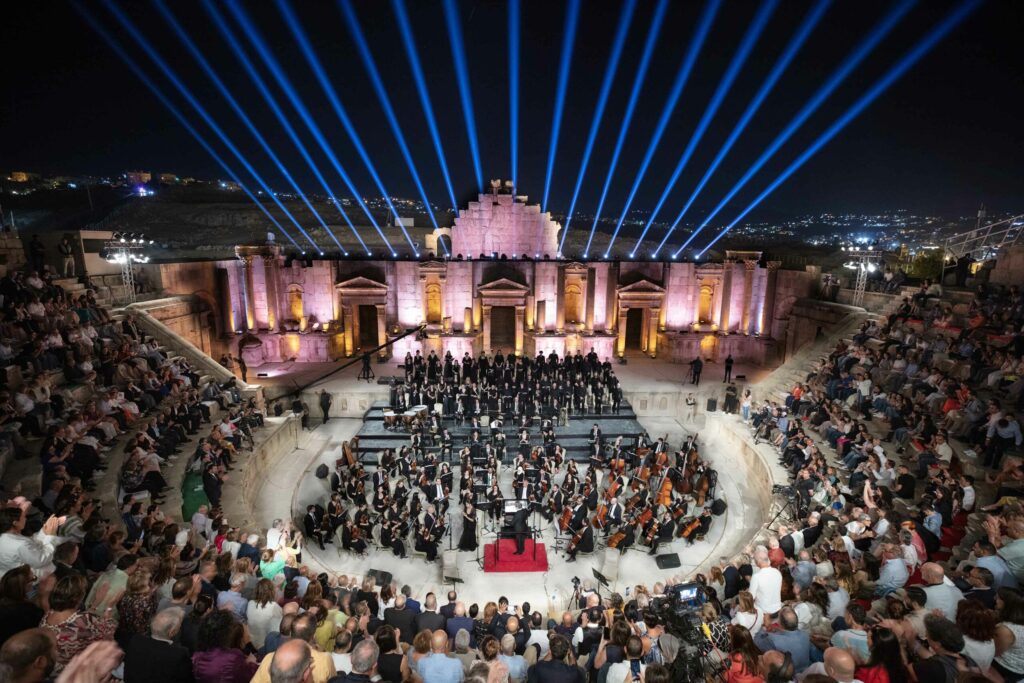Ravenna Festival
A Celebration of Art, History, and Innovation
Blending world-class performances with ancient heritage, the Ravenna Festival is a remarkable convergence of music, culture, and history.
The Ravenna Festival, founded in 1990 by Cristina Mazzavillani Muti, has steadily gained prominence as one of Italy’s most distinguished cultural festivals. It is celebrated not only for its eclectic programming but for its profound use of the city’s historical backdrop. Ravenna, once the capital of the Western Roman Empire, is renowned for its UNESCO World Heritage sites, including basilicas adorned with breathtaking mosaics. These landmarks serve as the festival’s stage, bringing centuries-old monuments to life through contemporary and classical performances.
Each year, the festival runs from May to July, with a second wave of programming during its Autumn Trilogy in November. Over the course of two months, Ravenna becomes a city-wide stage for opera, symphonic music, chamber music, ballet, and more. The performances take place in a variety of venues, from the grand Teatro Alighieri to the stunning Basilica of San Vitale, blending the majesty of historic architecture with the immediacy of live art. This unique synthesis of place and performance creates an immersive experience for audiences, making the Ravenna Festival not just a series of events but a journey through history, art, and culture.

The festival is known for its bold and innovative programming, with each edition centered around a distinct theme. These themes often explore human and cultural connections, historical narratives, or philosophical reflections. For example, past festivals have paid tribute to historical icons such as Martin Luther King, Nelson Mandela, and Dante Alighieri, while others have addressed the cultural exchanges between the Mediterranean and the East. The 2024 edition, titled “E fu sera e fu mattina” (And the Evening and the Morning), draws inspiration from the Book of Genesis, focusing on themes of environmental sustainability, the impact of climate change, and the importance of creativity as a tool for cultural connection.
One of the festival’s hallmarks is its ability to marry the past with the present. It not only presents well-loved classical masterpieces but also commissions new works and stages contemporary productions. Artists and performers from all over the world come to Ravenna to participate in its vibrant, cross-disciplinary programming. The festival features symphonic and chamber music, jazz, ethnic music, ballet, and opera, alongside performances of spoken word and drama. This multidisciplinary approach allows the festival to appeal to a broad audience, making it a must-attend event for both classical music aficionados and those interested in broader artistic expressions.
Riccardo Muti, one of Italy’s most respected conductors, has been a vital figure in shaping the festival’s identity. His leadership of the Vie dell’Amicizia (Roads of Friendship) project since 1997 has been a profound aspect of the festival’s mission to foster peace and reconciliation through music. Each year, Muti and his orchestra perform in cities that have experienced war or conflict, such as Sarajevo, Beirut, and most recently, Kyiv. These concerts symbolize unity and brotherhood, using the universal language of music to build cultural bridges and restore historical ties. This initiative has become a defining feature of the Ravenna Festival, reflecting the festival’s role as both a cultural and social force.
The Ravenna Festival has also become a platform for new works and reinterpretations of classic operas. In recent years, the Autumn Trilogy has offered daring productions that reimagine opera in innovative ways. The 2024 trilogy will present Il ritorno di Ulisse in patria, Dido and Aeneas, and a recital by Jakub Józef Orliński, continuing the festival’s tradition of breathing new life into classic works. These productions are staged in the intimate setting of Teatro Alighieri, allowing audiences to experience opera in a closer, more personal environment.
In addition to its artistic programming, the festival places great emphasis on cultural and environmental sustainability. For the 2024 edition, many performances will be staged outdoors in natural settings, such as the pine forests near Ravenna or on the city’s beaches. These performances are designed to minimize the use of artificial lighting and large stages, focusing instead on the natural beauty of the surroundings. This reflects the festival’s growing commitment to environmental consciousness, aligning with the broader global dialogue on climate change.
What makes the Ravenna Festival truly stand out is its seamless integration of history, art, and culture. The city of Ravenna, with its rich Byzantine and Roman heritage, provides an extraordinary setting for the festival’s diverse programming. Audiences not only come for the music and performances but also to immerse themselves in the city’s unique cultural legacy. Walking through the streets of Ravenna, visitors are surrounded by ancient mosaics, historic churches, and reminders of the city’s storied past. This cultural richness enhances the festival experience, making it a deeply moving journey for both performers and audiences alike.
In conclusion, the Ravenna Festival is more than just a showcase of artistic talent; it is a cultural pilgrimage that invites audiences to explore the intersection of history and art. Its innovative programming, commitment to sustainability, and use of historic venues make it one of the most unique and important festivals in the classical music world. Whether you are a devoted opera lover, a fan of symphonic music, or simply someone looking for an unforgettable cultural experience, the Ravenna Festival offers something for everyone, all within the breathtaking beauty of one of Italy’s most historic cities.
